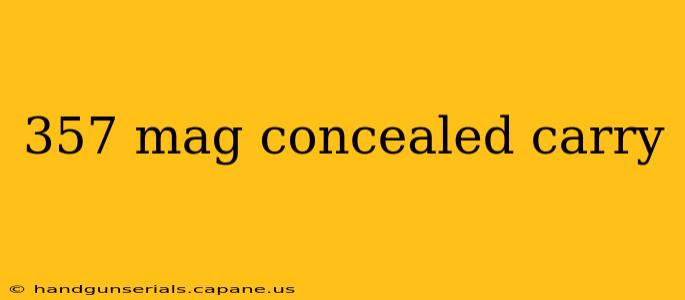The .357 Magnum is a powerful cartridge, renowned for its stopping power. Its suitability for concealed carry, however, is a complex issue demanding careful consideration. This guide explores the pros and cons of choosing a .357 Magnum for concealed carry, helping you make an informed decision based on your individual needs and circumstances.
The Allure of the .357 Magnum for Concealed Carry
The .357 Magnum's reputation precedes it. Its substantial stopping power makes it a compelling choice for self-defense. The potential to incapacitate a threat quickly is a significant advantage in a life-or-death situation. Moreover, the availability of both .38 Special and .357 Magnum ammunition offers flexibility. Shooting .38 Special in a .357 Magnum revolver provides a milder recoil experience during practice, allowing for more comfortable training.
Advantages of a .357 Magnum Concealed Carry Setup:
- Stopping Power: The sheer power of the .357 Magnum is its primary draw. Its larger caliber and higher velocity deliver significantly more energy to the target, potentially leading to quicker incapacitation.
- Versatility: The ability to shoot both .38 Special and .357 Magnum rounds offers significant advantages. .38 Special provides a gentler recoil for practice and reduced wear and tear on the firearm, while .357 Magnum provides maximum stopping power when needed.
- Penetration: .357 Magnum's higher penetration capabilities are crucial for overcoming barriers like clothing and car doors, a critical factor in self-defense scenarios.
Challenges of Concealed Carrying a .357 Magnum
Despite its advantages, the .357 Magnum presents several challenges for concealed carry:
Disadvantages of a .357 Magnum Concealed Carry Setup:
- Recoil: The significant recoil of a .357 Magnum can be difficult to manage, especially for smaller individuals or those with less shooting experience. This strong recoil can hinder follow-up shots, a crucial element in a self-defense encounter.
- Weight and Size: .357 Magnum revolvers, even snub-nosed models, tend to be heavier and bulkier than comparable handguns chambered in smaller calibers. Concealing a heavier firearm can be more challenging and less comfortable for extended periods.
- Muzzle Flash and Noise: The .357 Magnum's potent charge produces a significant muzzle flash and loud report. In close-quarters situations, these factors can momentarily disorient the shooter and draw unwanted attention.
- Ammunition Capacity: Most .357 Magnum revolvers have a lower ammunition capacity than semi-automatic pistols in smaller calibers, offering fewer rounds available in a self-defense scenario.
Choosing the Right Firearm and Ammunition
Selecting the right .357 Magnum revolver is crucial for concealed carry. Snub-nosed revolvers offer better concealability, but their shorter barrels can increase recoil. Consider the weight, size, and overall ergonomics of the firearm. Thorough training and practice are essential to manage the recoil effectively and maintain accuracy. Furthermore, selecting appropriate ammunition—balanced between stopping power and manageable recoil—is key.
Alternatives to Consider
Before settling on a .357 Magnum for concealed carry, it's prudent to evaluate alternative calibers offering a balance between stopping power, manageability, and concealability. The 9mm, .40 S&W, and .45 ACP are popular choices for concealed carry, each with its own set of advantages and disadvantages.
Conclusion
The .357 Magnum offers undeniable stopping power, making it a tempting choice for concealed carry. However, its substantial recoil, weight, and potential for difficulty in follow-up shots require careful consideration. An individual's physical characteristics, experience level, and comfort with recoil are all critical factors in determining its suitability. Weighing the advantages and disadvantages against alternative calibers is vital before committing to this powerful, but demanding, cartridge for self-defense. Ultimately, the best concealed carry firearm is the one you can consistently handle safely and accurately. Remember, proper training is paramount regardless of the caliber you choose.

